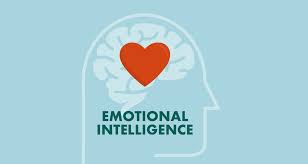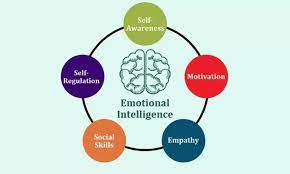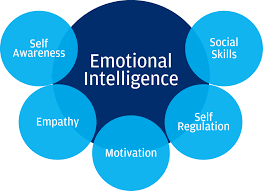Introduction
Emotional intelligence is the skill of recognizing and effectively positively managing our own emotions to communicate freely without any barriers, relieve stress, and defuse conflicts. An individual can perceive and analyze emotions. Few researchers have the view that emotional intelligence as a skill can be enhanced by learning and strengthened while others have claimed that it is an inborn characteristic. The recent research so developed put light on the fact that emotional recognition, is an attribution to emotional states which is primarily dependent on observations developed through visuals and auditory clues. It was seen that people equipped with high emotional intelligence possess greater mental health, job performance, or contributions made towards task given, and leadership skills. Emotional intelligence is a skill most commonly reflecting the spirit of empathy because it enables an individual to connect their personal experiences with their peers or staff working.
Emotional intelligence can be best described concerning a few attributes:
- Self-management- it is when an individual is capable enough to control impulsive feelings and behaviour. It is an effort on the part of an individual to manage emotions healthily, follow through the commitments so developed and quickly adapt to any alterations so seen in the current circumstances. People with high emotional intelligence would also have to bear bad moods, and impulsive and negative emotions like- anger, and stress, where there is a need to have a hold over this rather than enabling them to have to control over their life. Negative emotions so engulfed and impulsive behaviour so undertaken would not only impact the surroundings but would also toll the well-being of a person.
- Self-consciousness- it is a condition when a person recognizes their own emotions and their relevant impact on thought and behaviour. One is already aware of one’s strengths and shortcomings and thus has self-confidence. Here individuals can look over their patterns of behaviour and motives and how the surrounding environment can influence them. Here a person can also identify its trigger points which may either turn them weak or neutral. If a person at a certain moment is feeling stressed out or annoyed or degraded then the person must need to sit and do an internal check and investigate the possible reasons behind the issue. By recognizing the cause, one would be in a position to find productive ways to deal with other difficult colleagues.
- Social awareness- when one already had a feeling of empathy and thus possesses the ability to understand emotions, requirements, concerns, and problems faced. The strength of recognizing the power dynamics in the organization one is working.
- Relationship management- one knows how to develop cordial relations, communicate effectively concisely, and clearly, inspire others and influence others, and finally manage conflicts if arise.
- Motivation- people who possess a high degree of emotional intelligence are highly motivated. They are willing enough to defer immediate and quick results for attaining long-term success. High productivity is one of their characteristics and they love to take on challenges. When a person had to face any setback or failure then it’s only our motives that would inspire one to move ahead. Those who possess’ low motivation power are found likely to be risk averse rather than risk takers and grab an opportunity anxious. Lack of motivation may lead people to express their negative thoughts in the projects so undertaken concerning goals and duties rather than boosting morale.
Importance of emotional intelligence
It is a scientific fact that emotions precede thoughts, when emotions are strong enough then the way of brain functioning changes, reducing cognitive ability, decision-making power, and also interpersonal skills. Recognizing and managing one’s emotions helps an individual to be successful in their personal and professional life as well.
At a personal level emotional intelligence aids, us:
- Indulging in uncomfortable conversations without hurting anyone.
- Effectively manage emotions when feeling distressed or overwhelmed.
- Improve relationships with the people we care about.
In the professional world it can aid us in:
- Resolving conflicts in the workplace
- Influence and motivate others to rise
- Creating a culture of collaboration
- Establishing and building psychological safety within the teams
Conclusion- Emotional intelligence is a skill that enables a person to recognize and understand what other people are thinking and experiencing. By investing the time and effort to pay attention to others, one will gain insight into one’s emotional state as well as one’s values and beliefs. Once emotional awareness is in action, one can effectively develop additional social/emotional skills that will make one’s relationships more effective, fruitful, and fulfilling.



